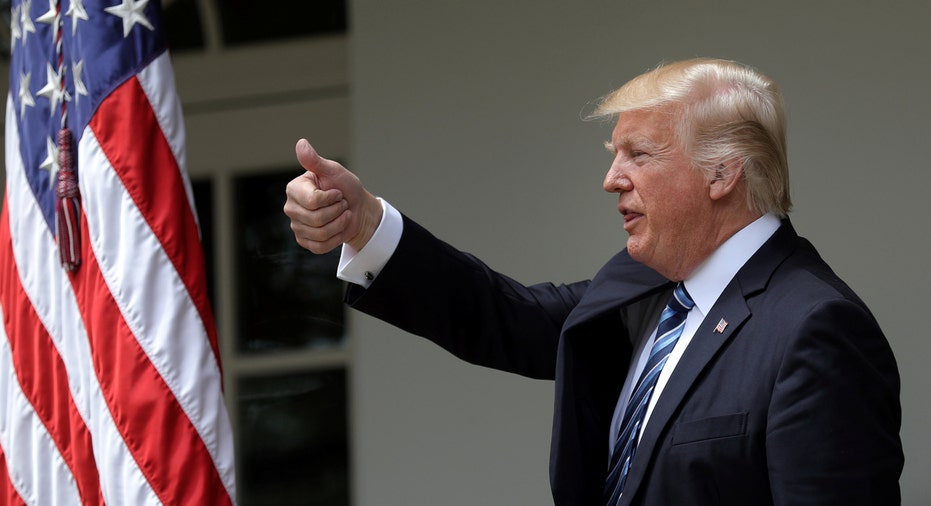Taxes, budget are focus for Trump despite probes

President Donald Trump is thousands of miles away, but his policy agenda faces tests back home this week as he looks to shift the focus from Russia investigations to his plans for boosting American military power and revamping the tax code.
The White House on Tuesday will roll out a budget proposal crystallizing the president's priorities in a blueprint that calls for large cuts to social safety-net programs such as Medicaid and food assistance while increasing Pentagon and border-security spending.
While Mr. Trump visits Pope Francis in Rome on Wednesday, Treasury Secretary Steven Mnuchin in Washington will testify about Mr. Trump's 2018 budget plan before the House Ways and Means Committee. The same congressional panel will hold a separate hearing devoted to a tax overhaul aimed at reducing rates and speeding job growth -- a centerpiece of Mr. Trump's campaign message.
Following a drumbeat of revelations about Mr. Trump and Russia over the past two weeks, the White House and congressional Republican leaders are eager to show that they can deliver on policy promises.
"People in the country need to know that we are busy at work trying to solve their problems," House Speaker Paul Ryan said. "So I realize that there's a lot in the media these days. That doesn't seize up Congress. That doesn't stop us from doing our jobs, to work on people's problems."
A potential land mine for the Trump administration is a report coming out this week from the Congressional Budget Office. The nonpartisan CBO will release its evaluation of the health-care bill that narrowly passed the House on May 4 following an intensive lobbying push by the White House.
The analysis could influence the bill's fate in the Senate by giving lawmakers a fuller picture of how much the measure will cost and how many people might lose insurance coverage.
Meantime, the congressional machinery devoted to the Russia probe continues.
A high-profile witness will appear before the House Intelligence Committee this week as part of the panel's investigation into alleged Russian interference in the 2016 election, including questions about whether anyone from Mr. Trump's campaign colluded with the Kremlin.
John Brennan, the former Central Intelligence Agency director under President Barack Obama, will testify publicly on Tuesday -- a hearing that is expected to shed new light on how the Obama administration's intelligence agencies came to the determination that Russia interfered in the 2016 election.
The Senate Intelligence Committee is also preparing for a hearing with former Federal Bureau of Investigation Director James Comey after Memorial Day. A final date hasn't been set. But the hearing is expected to be a moment of high-drama, with Mr. Comey facing questions about a memo he wrote saying that Mr. Trump asked him to back off an investigation into former national security adviser Michael Flynn.
Asked whether he had said any such thing to Mr. Comey, Mr. Trump told reporters at a news conference last week: "No. No."
Many presidents in modern times have endured distracting investigations that threatened to derail their agendas. Former Republican President Ronald Reagan faced the Iran-Contra scandal, while Democrat Bill Clinton dealt with long-running inquiries into the real-estate deal known as Whitewater and the probe into his affair with Monica Lewinsky.
Last week, the Justice Department named former FBI Director Robert Mueller as a special counsel to head the investigation arising from allegations that Russia interfered in the presidential race. Some allies of Mr. Trump believe this is a welcome development that will enable the White House to concentrate on its priorities and defer to Mr. Mueller while the investigation plays out.
Anthony Scaramucci, who served on Mr. Trump's transition team, said in an interview Sunday that a stock answer from the White House when it faces questions about the Russia probe should be: "We have a special counsel. Why don't we just allow them to do their work."
Inside the White House, Trump aides say they have been discussing ways to compartmentalize tasks so that the probe doesn't consume the building and doom various policy goals. Some veterans of past administrations believe such concerns are justified.
"There's reason to be concerned that all of the turbulence surrounding stuff like the Comey firing will distract from and delay what should otherwise be a very robust and positive economic policy agenda," said Joshua Bolten, a former White House chief of staff under George W. Bush and chairman of the Business Roundtable, a trade group representing some of the biggest U.S. firms. "We don't have a lot of weeks to spare if serious [tax] reform is going to get through."
Staying disciplined amid the Russia probe depends to some extent on Mr. Trump and the restraint he is able to show. In the past, the president has seen fit to tweet about various matters in the news that upset him, giving the issues new life.
Since leaving for his trip last week to the Middle East and Europe, Mr. Trump hasn't addressed the Russia controversy in his twitter feed. Nor has he gone off script in any of his public remarks.
Ken Duberstein, a former chief of staff to Mr. Reagan who dealt with the fallout from Iran-Contra, said that the Reagan White House set up a system in which the counsel's office focused on the scandal, leaving others to focus on their jobs. He said the Trump White House should consider a similar arrangement.
"A lot of these lessons apply to any president, because every president invariably goes into the ditch on something," Mr. Duberstein said.
--Nick Timiraos and Jacob M. Schlesinger contributed to this article.
Write to Peter Nicholas at peter.nicholas@wsj.com and Byron Tau at byron.tau@wsj.com



















